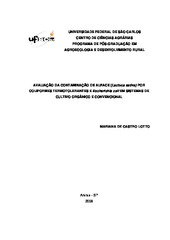Avaliação da contaminação de alface (Lactuca sativa) por coliformes termotolerantes e Escherichia coli em sistemas de cultivo orgânico e convencional
Abstract
Lettuce (Lactuca sativa) is the most consumed vegetable in Brazil, being classified as an important food, to be a rich source of vitamins. According to the practices adopted, its cultivation can be organic or conventional. However, lettuce can be a transmitter of pathogenic microorganisms to humans, as thermotolerant coliforms and Escherichia coli, since it is in contact with these contaminants often present in soil, water, in natural inputs (poultry litter) providing their development and survival. This research aimed to assess quantitatively the presence of thermotolerant coliforms and E. coli in water for irrigation and washing water, and the not washed and washed lettuce, grown under organic and conventional systems. The samples were collected in ten farms, five under organic and five under conventional systems, located at the cities of Ibiúna, Jaguariúna, Campinas e Morungaba - SP. In the laboratory, the samples were submitted to the analysis by the technique of counting the Most Probable Number. The results show that water for irrigation was considered one of the main factors responsible for contamination of lettuce, as showed by the presence ofhigh rate of thermotolerant coliforms and E. coli, independent of the cultivation system. However, the conventional system had been showing levels of contamination by thermotolerant coliforms and E. coli in water higher thanin organic system. In lettuce, pre washing contributed to the reduction of contamination by thermotolerant coliforms and E. coli in the product; however contamination by thermotolerant coliforms was considered high in the both cultivation systems. Moreover, others practices used in the farm such as personal hygiene, the inappropriate use of compost and the presence of animals in the areas of crops are source of contamination.
